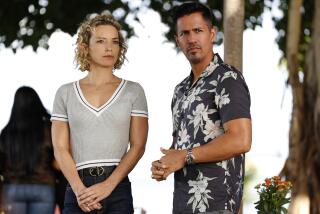Travis Stork of âThe Doctorsâ
As more people get their health information from TV and the Internet, it becomes crucial to have experts on the small screen who can provide accurate information. Thatâs where Travis Stork, co-host of the TV show âThe Doctors,â comes in.
Stork, an emergency room physician, is passionate about educating the public on how to prevent the illnesses that bring so many people in to see him in a crisis. Here, Stork, a onetime contestant on âThe Bachelor,â talks about getting outdoors, redefining fast food and using television as a positive influence.
Prevention is important to you. Do you have a No. 1 recommendation for staving off life-threatening health problems?
If thereâs one piece of advice I could give people, I would say sit less and move more. Weâve learned more and more that people who are active â even if that just means walking more, being on your feet more throughout the day â not only live longer, but they are burning calories throughout the day that really do add up. Itâs called NEAT â non-exercise activity thermogenesis â and itâs really a way that any of us and all of us can get more activity in our day even if we donât have time to hit the gym or get a formal workout.
On top of that, another really important piece of the puzzle is the lost art of making simple, healthy meals at home. I wish we could redefine fast food â it does not need to be unhealthy. A handful of mixed nuts when youâre hungry is fast food, but itâs great for your heart and helps you feel full longer. Iâd like to redefine these terms so that theyâre healthier.
As an ER doctor, what are the most preventable illnesses that you see people need emergency care for?
When it comes to the ones that are the leading killers in the country, like heart disease, the majority of risk factors are modifiable behaviors. If you can change the way you eat and get more active and quit smoking, you can really decrease the major risk factors of heart disease. You cannot control your genetics, but you can take control of everything else. So if genetics dictate 30% of what happens to you, you are in control of the other 70%.
I want people to understand that diabetes, obesity, and from there everything like sexual dysfunction, arthritis, depression, can become interlinked. Oftentimes what I see in the emergency department is that one illness begets another: Obesity leads to heart disease leads to diabetes.
Youâre an outdoorsman. How important is it for people to find activities that they like when looking for ways to get exercise?
Two points are important: One, finding activities that you love ensures that youâre going to want to do it for the rest of your life. The outdoors part is important for me because when you exercise outdoors, your body releases more endorphins, which can not only fuel your workout but can fuel your mood. Some studies have shown that even if you look out the window while exercising it can fuel your workout.
For me, getting outside really helps me reset mentally. Even if I just go for a walk, I do it as much for the mental boost as the physical boost. Studies do show that being active, doing something you love, getting outdoors can really improve mood and can even help people if they are feeling depressed. I love things that you can do to prevent illness that donât involve taking a pill.
Youâve managed to channel television to get a positive message out there about health and wellness, but in general do you think people are watching too much TV?
I think that television can be an incredibly useful tool, but itâs like anything in life: If you do too much of it, it can be bad for your health. I do think that on average we watch too much television, but there are ways that you can use television to your advantage if you pick your favorite show and you limit your screen time.
If your habit is every night â you come home and after dinner you watch TV, thereâs nothing inherently wrong with that, but a better way to go would be to go for a walk as a family and television is going to be your reward. Or walk on the treadmill while you watch your favorite show.
Do you have a favorite episode of âThe Doctorsâ or a favorite topic that youâve covered?
My favorite episode was one that we taped recently with Valerie Harper [who has terminal brain cancer], and itâs because we were able to share a message with our viewers that no matter what happens in life, how dire your circumstances, no matter what youâre going through, you never give up hope. Her message was live your life, and itâs one of the things I love about âThe Doctors.â We can talk about really serious medical issues, we can even talk about death on our show, and from that not only give hope but share a positive message and educate people along the way.






